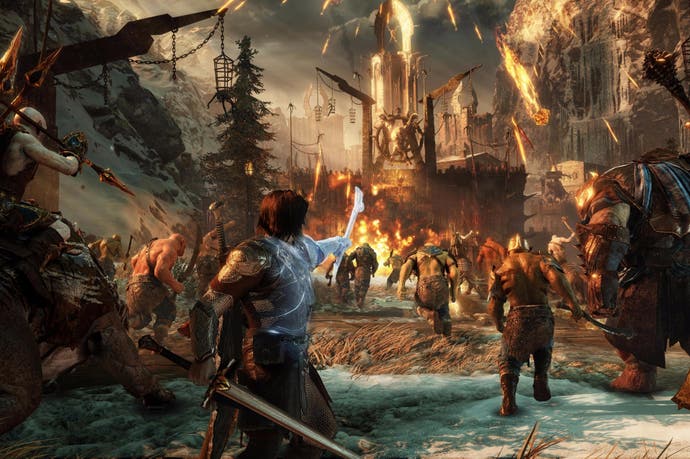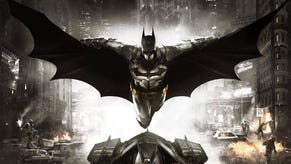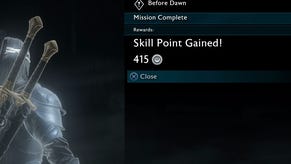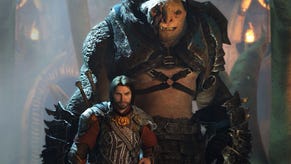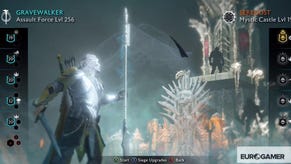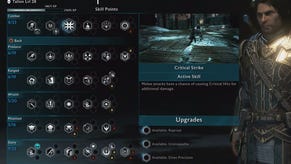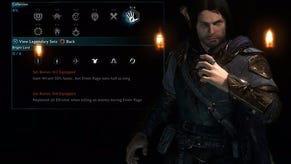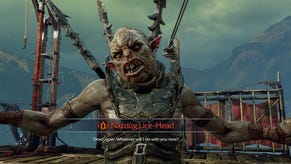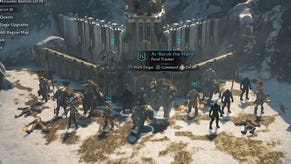Middle-Earth: Shadow of War goes wild with the brilliant Nemesis system
Plus see 16 minutes of gameplay for Monolith Productions' sequel.
If you were hoping for a flash of colour after the exceptionally bleak Middle-Earth: Shadow of Mordor, then be warned; the generically titled follow-up Shadow of War is grimmer, grimier and darker than what went before. This is Peter Jackson's mud and blood take on Tolkien's classics pushed into murkier water still, where eyes are gouged out and limbs torn asunder. Monolith Productions' take on Middle-Earth is not the kind of place you'd want to take a Sunday stroll, but why should it be? This is war, after all.
Shadow of War is a pointedly more epic game than its predecessor, in the tale it tells as well as its world and its features. You're brooding ranger Talion and the wraith he's merged with, Celebrimbor, once again, the story picking up where Shadow of Mordor left off - and look away now if you're averse to spoilers - with the two seeking to forge a new Ring of Power, granting them the ability to recruit members into their growing army.
The war between orcs and men has seen its front-lines move towards Gondor, and our gameplay demo takes place some hours into the main quest as Talion makes moves towards taking back a Gondorian city that's been seized by the Dark Lord Sauron and transformed into the fortress of the Witch King.
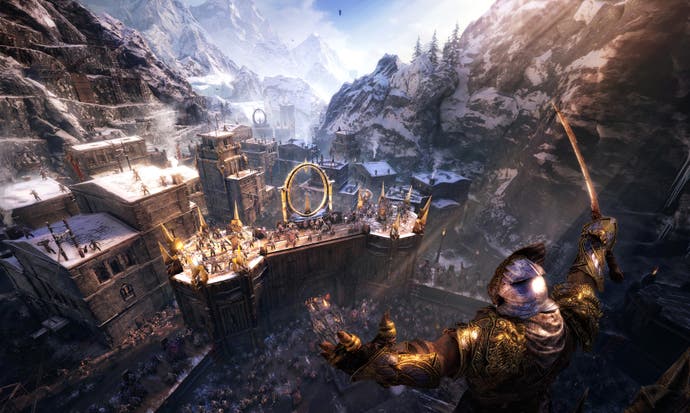
Which speaks to Middle-Earth: Shadow of War's big new trick. The original Middle-Earth: Shadow of Mordor was a fairly humdrum open world game elevated to something else entirely thanks to the brilliant nemesis system, whereby rivalries would blossom and a twisted social network all of your own design would course across the land, letting you tell your own stories as you go. Monolith Productions has been smart to double down on the feature for this sequel.
This time out, the nemesis system extends to fortresses, unique villain's lairs that cast their own shadows across the regions in which they reside. They're customisable - flaming arrows, flaming oil, making each assault and defence unique - and upgradeable, forming the backbone of the forces you acquire over the course of the game.
Elsewhere, the orcs themselves - pantomime villains in the original complete with cockernee accents - have a little more diversity and a lot more character. They belong to different tribes that compete with each other, all of which plays into the expanded nemesis system. Some come running into battle on mounts, thankfully not including the Olog-hai - or war trolls to you and I. The new nemesis system tracks a wider range of behaviour, too, such as grudges - leave a comrade behind to die in battle, and they may come back to exact their revenge later in the game. Whereas the nemesis system was built around revenge in Shadow of Mordor, in Shadow of War it's more nuanced, folding in the alliances formed - and broken - on the battlefield.
It makes for more variety in the enemies you come across and the encounters you have, and more flexibility in those you can recruit as the war around you picks up its pace. Use a war troll to break through the outer defences, recruit a spy who can infiltrate the enemy ranks and - most importantly - don't forget to wet your own hands with some orc entrails. Shadow of War's combat looks as meaty and varied as its predecessor, and the Arkham influence is still there even if it's expressed with a little more bloodlust. In a short hands-off demo we see heads being torn from bodies and swords being plunged messily into skulls, drakes mounted and alliances called upon in a noisy, messy coup. As with the previous game, it's up to you how you dispose of an area's overlord - you can use your ring of power to recruit them, kill them or shame them, thereby reducing their level and potency in the world.
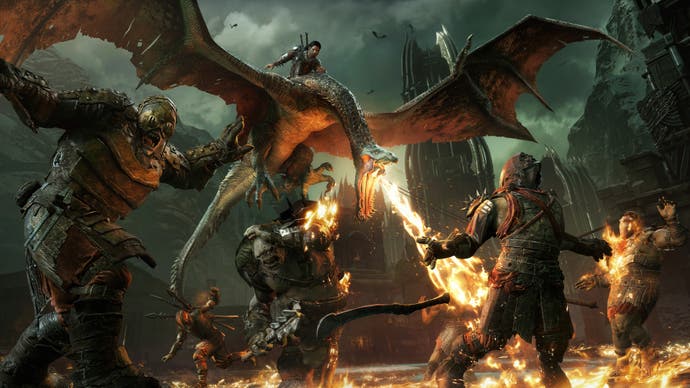
It's a rousing demo, not least thanks to publisher Warner Bros choosing to showcase Shadow of War in a San Francisco multiplex cinema where the battle bellows and roars through a 4K projector (and in that regard, support has already been confirmed for Microsoft's Scorpio and Sony's PS4 Pro). For all that cinematic pomp, though, there's something old-fashioned about an 'adult' action game that holds a juvenile obsession with blood, gore and grit, and there's a relentlessness to its grimness that might prove wearying over time. As was the case with the first Shadow of Mordor, really, a game that overcame its drab aesthetic with the brilliantly refreshing nemesis system, so it's reassuring that Monolith Productions is making that its focus for the sequel. This is a studio, after all, that should know better than to make an enemy of itself.
